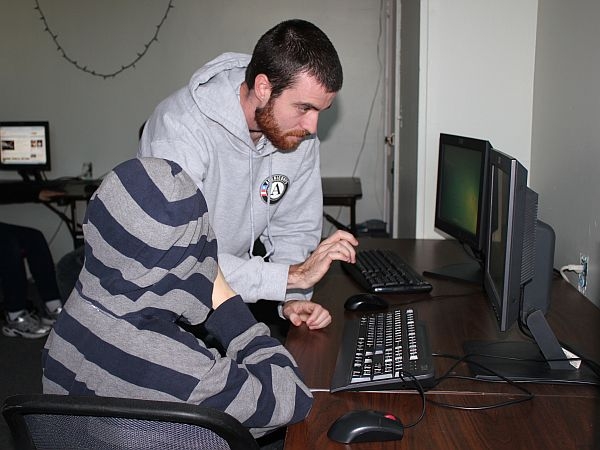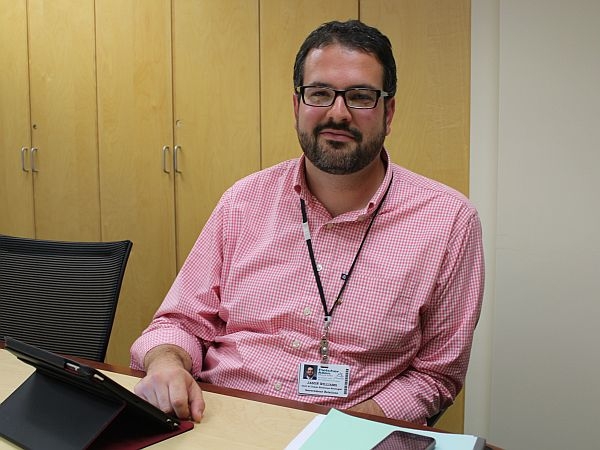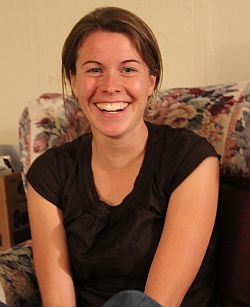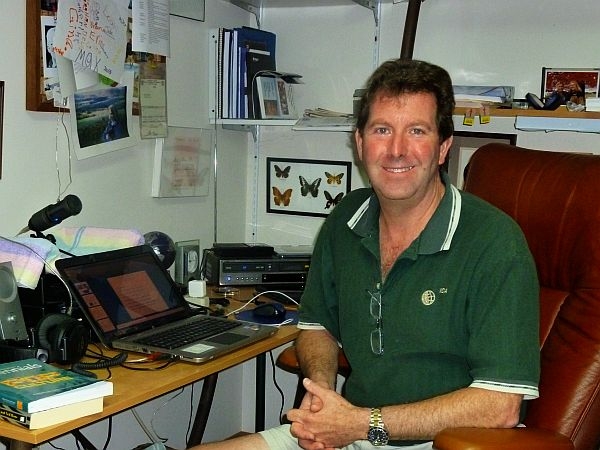 Vermont has a generation gap. Young adults in their 20s are part of the largest generation ever in America. But Vermonters ages 20 to 34 continue to leave the state. And a low birth rate means they’re not being replaced. Politicians have debated for years the significance, but most agree the trend is cause for concern about the economic and cultural well-being of the state.
Vermont has a generation gap. Young adults in their 20s are part of the largest generation ever in America. But Vermonters ages 20 to 34 continue to leave the state. And a low birth rate means they’re not being replaced. Politicians have debated for years the significance, but most agree the trend is cause for concern about the economic and cultural well-being of the state.
Over the next four days, we’ll delve into how this trend affects the economic and cultural well-being of the state.
Today, VPR’s Fran Stoddard lays out the problem.
(Stoddard) Misha Tourin is a dashing 26-year-old from Jericho who appears to buck the trend.
He works at a teen center as part of the AmeriCorps program. He’s lived in California, Asia and Washington DC. But now he’s back in his home state because Vermont’s values match his own.
(Tourin) "I’m inspired definitely by the attitude in Vermont. There seems to be a very forward-looking mentality here. People are interested in sustainability and local food and a lot of things that I haven’t seen picking up in other places. But I’m also making a third of what I was making in Washington DC. And it seems like there isn’t something that bridges the gap between college and the professional world here in Vermont."
(Stoddard) And there’s the rub for many in his generation. Turin works for AmeriCorps. But he also juggles several other jobs. He works at a restaurant in Waterbury to boost his income. And, still, to make ends meet, he lives with his parents.
He says that’s far from ideal and he’s not sure if he’ll stay in Vermont.
(Tourin) "There’s probably 20 – 30 people replying to each ad for an apartment in Burlington. So if it’s affordable, it’s probably pretty well sought after." (He laughs)
(Stoddard) Many in this generation face a similar choice: Struggle through or live their values in a state they love. Or move away for better economic opportunities.
Jason Williams says the options can be stark.
(Williams) "I think we’ve made a choice to choose Vermont. And that comes with a better sense…an increased sense of community, but it also comes, in most likelihood, less pay."
(Stoddard) Williams says he landed a great job at Fletcher Allen right out of college and has been able to make his life here. And he’s also involved in civic life. He served on the "Next Generation Committee" five years ago that looked into the flight of Vermont’s young.
 (Williams) "At my ten year high school reunion – so I got to connect with folks over this. A lot of folks I know went away for school and then it was easier to find jobs wherever they went away to. I think there’s a philosophy that Vermont is a great place. It’s great to get experiences elsewhere, to earn money elsewhere, and then Vermont‘s a great place to connect and raise kids."
(Williams) "At my ten year high school reunion – so I got to connect with folks over this. A lot of folks I know went away for school and then it was easier to find jobs wherever they went away to. I think there’s a philosophy that Vermont is a great place. It’s great to get experiences elsewhere, to earn money elsewhere, and then Vermont‘s a great place to connect and raise kids."
(Stoddard) Economist Richard Heaps has been following this trend for years. He says, in many ways, youth migration is natural.
(Heaps) "We’re a rural state. Many young people do want to see the city, want all the entertainment and jobs and everything a city has to offer. And if you’re going to do that, well, you’re going to go to New York. You’re going to go to Boston. In fact, some good census studies show single, young, educated people flock to urban areas. And I think that’s pretty exciting. The question is, do they come back? Not until later do they come back in Vermont until they’re in their 40’s or 50’s."
(Stoddard) But for the health of the economy and the state’s communities, Heaps argues, Vermont needs to get those young people back sooner.
Twenty-four-year-old Kaitlin Francis says people in her generation find the economic barriers to returning can be challenging.
 (Francis) "I grew up here. I went to college here. I got the itch, like everyone else, to go out west and see a different part of the world for a while. Lived in Vancouver, British Columbia for six months. And drove back across the country for about a month. Moved back here over the summer with the intention of taking off again. But I think, in the driving all the way back across the country, seeing a bunch of different cities, a bunch of different places, I kind of came to appreciate how special the state of Vermont is, and how this is where I really wanted to be. So then the job search began."
(Francis) "I grew up here. I went to college here. I got the itch, like everyone else, to go out west and see a different part of the world for a while. Lived in Vancouver, British Columbia for six months. And drove back across the country for about a month. Moved back here over the summer with the intention of taking off again. But I think, in the driving all the way back across the country, seeing a bunch of different cities, a bunch of different places, I kind of came to appreciate how special the state of Vermont is, and how this is where I really wanted to be. So then the job search began."
(Stoddard) For many of Francis’ contemporaries, education is the ticket to the life they want. But getting a degree also contributes to the challenges of making a life in Vermont. Because education here is expensive.
(Speaker at rally) "Vermont spends about $40 million more a year on Corrections than it does on higher education. Since 1980, Vermont‘s drop in the level of public funding for higher education has been one of the largest in the country – 49%. Tuition costs for Vermont State Colleges, a direct reflection of the lack of public funding, is about double. And that’s conservative the national average."
(Stoddard) Students at Johnson State and other state colleges rallied against the high cost of college last fall.
Like others on the faculty, Johnson State President Barbara Murphy stood with the students at the rally.
(Murphy) "I wish you well and I’m here with you. (Applause)
(Stoddard) As the students continued to rally, Murphy laid out the challenges they’ll face once they graduate.
(Murphy) "They are certainly graduating with larger debt loads. And, you know, I think some debt is fine. I think students, will, in a good economy, take care of that debt in the 10 years they’re allowed to. But this is a difficult time. There hasn’t been the turnover in the workplace that we want to see for new, young 20 somethings starting out. I think they’re going to go where the jobs are. And then we have the out-of-staters who come to Vermont, get a good education, fall in love with Vermont and then can’t find jobs at the salaries they want. So this is an important problem to fix. I really mean it. We need the engineers who are going to be designing our roads. We need the earth scientists, who are going to be telling us about the quality of our water, our rock, and where we should put bridges and where we should re-build. All the more important for me – that we have and educated workforce to deal with these environmental, social problems for generations to come."
(Stoddard) The average debt for VT students is now $30 thousand in student loans, $8 thousand more the average national student debt.
And that staggering debt load is enough to send graduates out of state in a search for work. Karen Madden is director of academic support at Johnson State.
(Madden) "Our office deals with a lot of 1st generation college students and low income students. And what we see is that many of them work as well as go to school. Many of them want to stay in Vermont, but they can’t find jobs that allow them to really live and pay their debt. I mean, loan payments are often $3-400 a month. Many of them are still working in minimum wage jobs. A few of them have found jobs in their field, but not a lot of them. Many of them are coming in, trying to find out how they can put the debt off."
(Fran) College or no, young people are needed as an integral part of our economy, for entry level manufacturing and service jobs, for technology jobs, and as the group that can take entrepreneurial risks and to develop the next economic boom.
Economist Dick Heaps:
(Heaps) "The concern about having young people in particular – young people understand things that are involved particularly with technology and whatnot. They’re very adept at finding new niches. Young people can take chances that somebody 45 and 50 with a family can’t take. Young folks can start a business in their garage and of course most of them fail all the time. But some do succeed. And the growth of an economy, as we found out really depends not on the large companies, not on small companies, but on a select few start up companies that hit it and get big. And so we want a pool of young people to do that. And in Vermont we see that pool decreasing. And that part is particularly worrisome."
 (Stoddard) It also worries Steve Shepard. He is a technology and work force consultant who has studied the Millennial generation.
(Stoddard) It also worries Steve Shepard. He is a technology and work force consultant who has studied the Millennial generation.
(Shepard) "This observation that we are losing the kids here in Vermont to other places is a real concern. This generation is all about the community, all about the group. They want to be connected. They are a generation that wants to make a difference in the world. Motivated to do something important in the world. They want something more than a day to day job, so they are going to go for the jobs that does that; money’s just one of the motivators for them.
"And we’re going to get one chance to bring them in and keep them. So what we have to do is everything we possibly can as a state to create the kind of jobs that will attract these folks. And I don’t mean to imply that they have to be high-tech jobs, or they have to be jobs in e-gaming, and so on. Those are wonderful. But they have to be jobs, where the kids that graduate from these programs and get into these jobs feel as if they’re working for companies where they get to make a difference. And that’s fundamentally important. If they don’t feel like they’re making a difference, they will leave. And that will accelerate this intellectual flight that we are experiencing here in Vermont and other states as well."
(Stoddard) And yet, for all the challenges and all the worries, there is a vibrant community of younger Vermonters enriching our communities. Johnny Powell, who is 25, is the coordinator for the Essex teen center, where he works for AmeriCorps. For him and others, it’s not always about making money.
(Powell) "We are invested in our future. And we’re the first generation that’s not going to have it better than our parents did, in a long time. And the way we take opportunities as they’re presented to us, is going to be much different from the way our parents did it. It’s absolutely OK to not to make as much money. One thing that I think we wish is to move away from a society focus on making money. People my generation are more interested in experience doing good and making things better than they are in gaining money."
(Stoddard) Experts like Steve Shepard say they’ve discovered that’s a recurring theme for this generation. They came of age in a world dominated by the attacks of September 11, wars in the Middle East and the high school shootings at Columbine.
He says those events have helped to shape a world view for many of the Millennial generation that’s built around community. And so he’s optimistic.
(Shepard) "So in spite of all the piercings and the tattoos and the flip flops to formal occasions that we all laugh about, we’re actually handing the world off to a pretty group of people, with a pretty good philosophy and dynamic behind them, that will truly make a difference."
(Stoddard) But a strong sense of community doesn’t pay the rent or put food on the table if you want to start a family. So this generation says Vermont needs to pay attention to the challenges they face. Because those challenges are shared by the entire state.
For VPR News, I’m Fran Stoddard.
The Generation Gap Project is made possible by the VPR Journalism Fund.